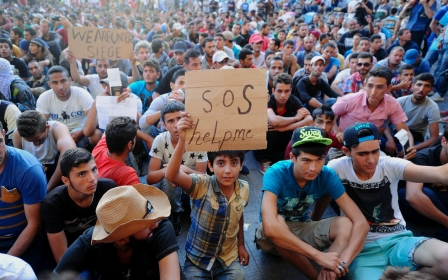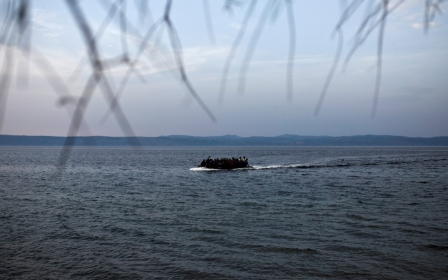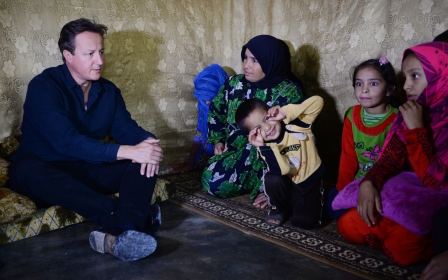Hungary closes border, as measures against migrants enacted

The refugee crisis in Europe intensified on Tuesday, with Hungary seriously clamping down on the border and the EU border agency announcing that 500,000 refugees and migrants had now crossed into the EU this year.
The latest influx, which according to the authorities saw more than 9,000 refugees and migrants enter Hungary on Monday, prompted the country to declare a state of emergency on Tuesday in two of its southern counties bordering Serbia.
Budapest has also begun to impose very strict border controls, criminalising people who cross illegally and all those who try to tamper with the barbed wire border fence.
On Tuesday, an official with the International Organisation for Migration (IOM) reportedly said that the fresh crackdown may be a violation of Hungary's obligations under the UN and EU rules on refugees and asylum and is potentially open to legal challenge.
"From my perspective," Magdalena Majokska-Tomkin, head of the IOM's Hungary office, told Reuters, "Hungary needs to respect its international obligations and allow people to claim asylum and provide facilities for them that are adequate for their condition."
At least 60 people have been arrested so far for trying to cross the border, authorities said. They face up to three years in jail or risk deportation.
Hundreds of refugees and migrants were reportedly stranded on the border overnight, where they slept in the open. Aid groups brought vital supplies, but concerns are growing that the situation could spiral as more refugees and migrants head north.
According to Reuters, hundreds of migrants and refugees have been spilling into the motorways in attempts to get through, with many more staging protests at the border.
"The Roszke and Asothalom road crossing points have been put out of operation from Tuesday 07:00am (0500 GMT)," said Laszlo Balazs, a border police official, at a press conference in Budapest.
There were conflicting reports from the border, with some aid agency staff saying the Roszke crossing had been closed from midnight.
"The border was shut and has yet to re-open," said Babar Baloch, a UNHCR spokesman at the border.
"Our staff do not have access, and the Hungarian authorities have not let us know about any schedule they have for re-opening the border.”
The main access points at the border were closed on Monday, but Hungary was allowing refugees and migrants to come in through other legal channels a few kilometres down the road, the Guardian reported.
The Hungarian authorities said that they had been forced to enact the measures because the Serbian authorities had not been restricting entry to refugees and migrants and were allowing them to travel north.
"The measure is in place due to the situation that has developed on the Serbian side, as border controls are not being provided," said Balazs.
Budapest has also announced that it will now build a barbed wire wall with fellow EU member Romania, the foreign minister said. Hungary’s prime minister, Viktor Orbán, who fiercely opposed immigration, has said that he expects many refugees and migrants in Hungary to be deported.
Serbia, however, has lashed out at Hungary, calling on it to open the border. Labour Minister Aleksandar Vulin has reportedly begun a protest at the border, calling on Hungary to re-open the crossings. He has said that the Serbian government is not negotiating with the Hungarian authorities over the matter and that they will not accept any asylum seekers who are registered in Hungary but sent back to Serbia.
“They are on Hungarian territory and I expect the Hungarian state to behave accordingly towards them," Vulin said.
Hungary, meanwhile, has said that it will begin deporting large numbers of migrants and asylum seekers.
In the last three months alone, 171,000 people have claimed asylum in Hungary, Gyorgy Bakondi, homeland security adviser to the Hungarian prime minister, said on Tuesday.
Of this, 300 asylum claims have been granted and 4,000 people have been deported. The procedure on a further 65,000 claims ended when the applicants “disappeared”, with another 95,000 claims still in the works.
The EU's border agency Frontex said that a "large number of the migrants arriving in Greece make their way towards Hungary, where the number of detections at its border with Serbia increased 20-fold to more than 52,000 in August, bringing the number so far this year to more than 155,000."
Some 3,500 were expected to pass through Serbia alone on Tuesday, Serbian authorities said.
New MEE newsletter: Jerusalem Dispatch
Sign up to get the latest insights and analysis on Israel-Palestine, alongside Turkey Unpacked and other MEE newsletters
Middle East Eye delivers independent and unrivalled coverage and analysis of the Middle East, North Africa and beyond. To learn more about republishing this content and the associated fees, please fill out this form. More about MEE can be found here.




